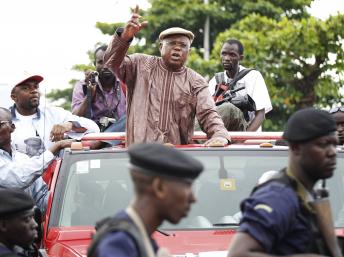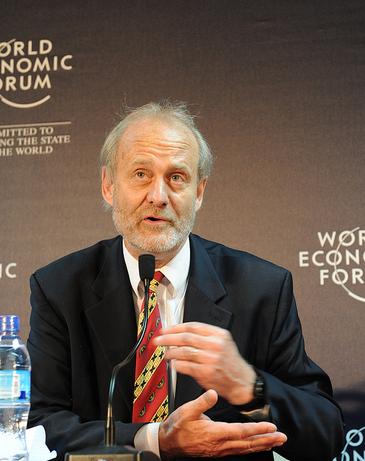Saving Sudan: Reflections on the Election
Although I was accredited with the Carter Center as an international observer, I did not join the Carter Center mission, but accompanied one of NED’s Sudanese partners, Tamam, which conducted a domestic observation effort in the north. I visited about a dozen polling centers around Khartoum, including Omdurman and the informal settlements of Haj Yusuf and Dar es Salam. The Tamam control room, using the Ushahidi cell phone reporting network, was a great means to get news from around the country about election problems and developments.
As a general rule I saw peaceful crowds on the first day of voting, and some logistical problems such as late openings, lack of indelible ink, and reports of candidates missing from the ballots. The crowds tapered off on the second day, and on the third day there were very few voters in the polling stations. From the voting tallies, I estimated a turnout of about 50 or 60 percent of officially registered voters; although in Omdurman, a stronghold of the Umma Party, which was boycotting, I estimated 10 to 20 percent turnout. The story in the south was quite different, where logistical difficulties and irregularities were much greater, but the competition produced more enthusiasm. The most serious election violation I witnessed was the apparent voting of persons coming from outside a particular district. A polling official had protested this, but was overruled by his superiors.
In the north, the NCP’s organizational apparatus was formidable. They had tents set up for their supporters at the legal distance at virtually every polling center I saw and a get-out-the vote effort including transportation to the polls that was overwhelming. Posters of Bashir and other NCP candidates were everywhere. I saw just one DUP tent, and quite a few posters for Yasir Arman of the SPLM, but not much sign of activity by the other parties. Party polling agents from various parties and domestic observers were present at virtually every station. Although I did not observe the actual counting, I understand that it generally took all day long and often went late into the night.
The elections were disappointing. Yasir Arman’s last-minute withdrawal from the race was a critical blow, leaving the other opposition parties politically exposed. Dropping out was probably their most sensible option tactically, but it eliminated any real competition. The evening before the election, Neetha and I attended a forum that included Yasir Arman and Mubarak al-Fadil, a presidential contender from one of the Umma factions, as well as representatives from several other parties. Arman described meetings with the NCP in which they proposed to allocate votes in such a way as to insure the NCP won, but also guarantee that the SPLM and Umma-mainstream would come in second and third with an agreed-upon allotment of votes. In other words, the intention was to rig the results of the election beforehand. And indeed, the census figures and registration figures were suspicious. Nevertheless, most of our partners and the participants in the forum placed the blame for the failure of the elections on all parties, both the NCP and the opposition. They had all been concentrated on wheeling and dealing in the run-up, and the opposition had made very little effort to mount a campaign. The NCP had massive resources, much of which was presumably courtesy of the government, as did the SPLM, which concentrated its effort in the south. The other parties had to raise funds privately, and were thus at a great disadvantage. This also meant that the debate within the opposition parties over pulling out was fierce, since individuals had invested a lot of their own resources to win local races, and had had the rug pulled out from them by the national leadership. If in fact the NCP intended to rig the elections, it is unfortunate, since they stood a good chance of winning anyway in a free and fair contest. As Jeff Gettleman of the New York Times has noted, Sudan’s economy has prospered impressively over the last ten years, especially for the central core population, and we encountered a lot of genuine support for Bashir. After most of the opposition pulled out, I heard reports that the government was trying to rig the results to be more favorable to the opposition, so their victory wouldn’t seem too overwhelming!
The main lesson here for the referendum is the need for confidence-building measures. Although Bashir has been making soothing statements about it, there is undoubtedly still a deep level of distrust among the politicians and the people. Negotiations and decision-making must be transparent, and education about the referendum process must be open and extensive. If Bashir allows the south to secede, he will need the support of the other northern parties, who might otherwise find some advantage in attacking him for “losing” the south. Sudan suffers greatly from this sort of political gamesmanship, but Bashir is trying to co-opt the opposition into the new government, and although not particularly democratic, such an arrangement is probably the best for a smooth referendum. The referendum does not have much time, and there are likely to be many of the same logistical hurdles that plagued the elections, but just as the government muddled through the elections, it would seem even more likely that they can succeed on schedule with the referendum. But greater consensus and transparency in the process will improve the chances.
The elections were by no means a wasted effort. They did not make Sudan a democracy, but they did increase democratic space significantly, and they did provide a trial run for the referendum and for future elections that might be more democratic. As Sudanese often reminded us, they have had the experience of democratic elections on a least four occasions since independence, none of which were challenged or required international observers. They also insisted that Sudan should not be held to some lower standard of elections, and the Carter Center rightfully assessed these elections as not being up to international standards. Nevertheless, in judging Sudan, it is fair to say their elections were much better organized and more credible than any of the last three held in Nigeria, which I’ve observed, and were much freer and more fair than the upcoming elections in Ethiopia, Rwanda, or Egypt – all American allies – are likely to be. Although not all of Sudan’s repressive legislation has been removed, and instances of press censorship or harassment of opposition still occur, there is nevertheless a much greater amount of freedom of speech, freedom of assembly, civil society activism, open criticism of the government, debate, and understanding of democracy and human rights than has existed in the past 20 years. In the aftermath of the elections, and in the post-referendum era, these gains must be preserved and built upon. Northerners are particularly concerned that the NCP will consolidate its power and return to its repressive ways in the absence of international attention. Likewise, in the south, the SPLM’s dominance and worrisome signs of corruption, authoritarianism and intolerance must be discouraged. Independence will not necessarily mean freedom.
The general peacefulness of the elections should not be discounted. Although again, there were a handful of violent incidents and reports of harassment (most of which emanated from the south); and because there was little competition in the north, the results were a foregone conclusion; nevertheless the comportment of the Sudanese citizens and the security forces was serious and restrained, and this bodes well for the referendum. Civil war in Sudan is by no means inevitable, and all efforts should be made to discourage any slide into violence. It is in Bashir’s interests to allow the referendum to proceed peacefully and freely, and to support the secession of the south, if it chooses to do so. As a Global Witness report outlines, the question of oil can strengthen the peace process and benefit both parties if handled in a transparent and pragmatic way. Progress is being made on the demarcation of boundaries, and other difficult issues such as citizenship can also be addressed peacefully. If there is any lesson that can be learned from the Darfur Peace Agreement, it is that such negotiations cannot be rushed, and that only patience and persistence is likely to produce lasting results.
Finally, it must be understood that only the Sudanese can save Sudan. Lip service is often given to this mantra, but the role of the international community can only be to support the efforts of Sudanese to extricate themselves from the burdens that history, environment, and demography have placed upon them. Forcing solutions on the Sudanese, north or south, will do more to heighten their resistance than to improve their behavior. As we were reminded by our Sudanese friends, they need to own this process, they need to believe that democracy and peace are in their best interests, they need to be the drivers of their fate, and not to be treated like stubborn children or dependent beggars. These elections were an important step in that direction, and however flawed, whatever cautionary advice they may contain, they still augur well for the future.
Dave Peterson is the Senior Director of the Africa program at the National Endowment for Democracy in Washington DC and has been traveling to Sudan since 1984. He made these remarks to the Commission on International Religious Freedom on May 3, 2010.







I figured you should see this:
http://michaeljamesbarker.wordpress.com/national-endowment-for-democracy-articles/
Jenny
The problem with people like Mr.Peterson is that they never think that in the third world and despite abject poverty there are still people who read and know who is who.
Mr.Peterson is comparing an election that already took place,and validating it against elections that have not yet been held(upcoming elections inEthiopia,Rwanda or Egypt).How fascinating a logic.
This is the most cruel betrayal of democracy.